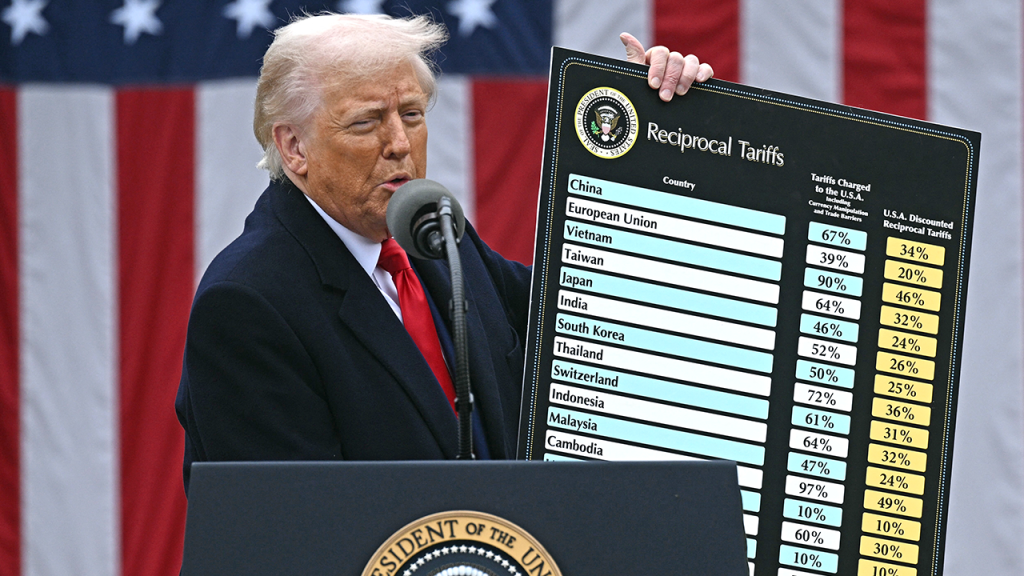The Senate recently faced a significant challenge regarding President Trump’s ongoing tariff policies. A resolution aimed at rejecting the so-called “Liberation Day” tariffs fell short, resulting in a 49-49 tie, which Vice President JD Vance ultimately broke. The outcome signifies a split within the Republican Party, as several members diverged from party lines, highlighting the contentious debate surrounding trade policy and its implications for the U.S. economy.
| Article Subheadings |
|---|
| 1) Senate Vote on Tariffs: Key Developments |
| 2) Republicans Divided: Who Voted Which Way |
| 3) The Economic Repercussions of Tariffs |
| 4) Senators Weigh In: The Tariff Debate Continues |
| 5) Conclusion: The Future of Trade Policy |
Senate Vote on Tariffs: Key Developments
On Wednesday, the Senate voted on a resolution aimed at rejecting President Trump’s “Liberation Day” tariff agenda. The proposal, introduced by Senator Ron Wyden, a Democrat from Oregon, was seen as a direct challenge to the President’s trade policy, particularly targeting the ongoing national emergency associated with the tariffs. The vote ended in a tie, with a tally of 49-49, demonstrating a significant divide among lawmakers. Vice President JD Vance was called to break the tie, emphasizing the procedural complexities of the vote.
This resolution was categorized as a “privileged” under Senate rules, meaning it had to be voted on regardless of the Republican majority in the chamber. The motion aimed to end the national emergency underpinning the tariffs, which many senators argue has caused undue economic stress on American families and businesses.
Republicans Divided: Who Voted Which Way
The vote highlighted a notable split within the Republican Party itself. Three GOP senators—Lisa Murkowski from Alaska, Susan Collins from Maine, and Rand Paul from Kentucky—joined their Democratic colleagues in supporting the resolution to terminate the tariffs. Their actions signify growing dissatisfaction even among Republicans regarding Trump’s trade policies, which some party members believe could harm the economy in the long run.
It’s important to note that prominent figures like Senate Minority Leader Mitch McConnell did not participate in the vote, and Senator Sheldon Whitehouse, a Democrat, was also absent. This absence raised questions about the overall support for the tariffs within the Republican ranks and misunderstanding about the impact of these measures on American citizens.
The Economic Repercussions of Tariffs
Economists have warned that the tariffs could lead to increased prices for consumers and reduced competitiveness for American businesses in global markets. Tariffs are generally seen as taxes imposed on imported goods, which can result in higher retail prices for a wide range of products. Critics argue that the additional costs incurred by businesses will ultimately be passed on to consumers.
Proponents of the tariffs contend that they are necessary to protect American jobs and industries from unfair foreign competition. They argue that taking a hard stance on trade is crucial to preserve U.S. economic interests. However, many adversaries, including lawmakers and economic analysts, caution that such protectionist measures may backfire, leading to job losses and economic stagnation rather than growth.
Senators Weigh In: The Tariff Debate Continues
In the lead-up to the vote, Senator Paul expressed his concerns about the adverse effects of tariffs on free trade, mentioning historical principles that support less taxation as a means to stimulate economic growth. He argued against the notion of declaring a national emergency to enable the tariffs, stating, “Everywhere, there’s an emergency everywhere. Sounds like an emergency everywhere is really an emergency nowhere.”
Senator Tim Kaine, a Democrat from Virginia, also voiced his concerns about the tariffs, particularly regarding their impact on relationships with trading partners like Canada. He questioned the logic of applying tariffs in situations that do not directly pertain to economic harm from other countries.
Conclusion: The Future of Trade Policy
The developments in the Senate surrounding tariffs reflect a crucial moment in U.S. trade policy and signal that bipartisan concerns may be rising against aggressive tariff measures. As the political landscape shifts, it remains to be seen how trade policies will evolve and whether lawmakers will heed calls for a more balanced approach. The outcome of these debates will undoubtedly shape the economic environment for American families and businesses for years to come.
| No. | Key Points |
|---|---|
| 1 | The Senate vote on Trump’s tariffs resulted in a 49-49 tie, broken by Vice President JD Vance. |
| 2 | Three Republicans joined Democrats in supporting the resolution to reject the tariffs. |
| 3 | Economic analysts warn that tariffs can lead to increased prices for consumers. |
| 4 | Debate continues within the Senate regarding the long-term implications of tariff policies. |
| 5 | The evolving political landscape may impact future trade policy in the U.S. |
Summary
The recent Senate vote against President Trump’s tariff agenda underscores the complex dynamics of American trade policy. As divisions emerge within the Republican Party and concerns mount about the economic impacts of tariffs, the future direction of U.S. trade strategy remains uncertain. Both political and economic factors will likely shape upcoming legislative actions, making this a pivotal moment for lawmakers and citizens alike.
Frequently Asked Questions
Question: What are tariffs, and why are they implemented?
Tariffs are taxes imposed on imported goods, intended to protect domestic industries by making foreign products more expensive. They are often used as a tool in trade negotiations to address imbalances.
Question: How did the recent Senate vote on tariffs reflect party divisions?
The recent Senate resolution saw significant dissent among Republicans, with some members breaking ranks to support the motion against tariffs, illustrating growing frustrations regarding Trump’s trade policies.
Question: What economic effects do tariffs generally have?
Tariffs often lead to higher prices for consumers, reduced trade volumes, and potential job losses in affected industries, although they are also intended to protect local businesses from foreign competition.


